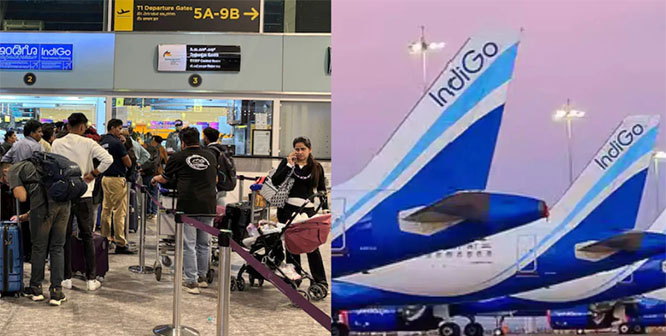Angry outbursts, long queues, and desperate appeals filled airports across India today as IndiGo grappled with a severe operational breakdown. Hundreds of flights have been cancelled or delayed, leaving thousands of passengers stranded through the night and forcing many to spend long hours at helpdesks.
Social media was flooded with videos of fliers pleading for assistance, accusing the airline of misleading updates, and demanding accommodation after being stuck for 10 to 12 hours at airports such as Hyderabad and Bengaluru.
What Triggered the Meltdown?
IndiGo has attributed the widespread disruption to “a multitude of unforeseen operational challenges.” These include:
• Minor technology glitches
• Winter-season schedule adjustments
• Bad weather
• Congestion in the aviation network
• New crew rostering rules (Flight Duty Time Limitations or FDTL)
Among these, the most disruptive has been the implementation of the updated FDTL norms introduced by the Directorate General of Civil Aviation (DGCA) in January 2024.
These rules were designed to reduce pilot fatigue and improve passenger safety. Key changes include:
• Longer weekly rest periods for flight crew
• A revised definition of “night,” extending it by an extra hour
• Tighter caps on flight duty timing and night landings
• Cutting night shifts for pilots and crew from six per roster cycle to just two
Once these norms became fully enforceable, airlines were required to overhaul rosters well in advance. For IndiGo, this triggered a sudden shortage of crew available for duty, leading to cascading delays and cancellations.
Why IndiGo Was Hit the Hardest
IndiGo is India’s largest airline by a wide margin, operating over 2,200 flights daily. That’s roughly double the number operated by Air India.
When an airline of this size experiences even a 10–20% disruption, it translates to 200–400 flights being delayed or grounded — producing massive spillover effects across the country.
IndiGo also relies heavily on high-frequency overnight operations, a model typical of low-cost carriers that aim to maximise aircraft utilisation and reduce downtime. The stricter FDTL norms clash with these overnight-heavy schedules, forcing the airline to pull back services.
Aviation bodies have also criticised IndiGo’s preparedness. The Airline Pilots' Association of India (ALPA) said airlines were given a two-year window to plan for the new rules but “started preparing rather late.” IndiGo, it said, failed to rebuild crew rosters 15 days in advance as required.
The Federation of Indian Pilots (FIP) went further, calling the crisis the result of IndiGo’s “prolonged and unorthodox lean manpower strategy,” and alleging that the airline adopted a hiring freeze even as it knew the new rules would require more careful staffing.
How Many Flights Are Affected?
In the past 48 hours, over 300 flights have been cancelled. At least 100 more are expected to be cancelled today.
City-wise impact:
• Hyderabad: 33 expected cancellations; several fliers stranded overnight
• Bengaluru: over 70 expected cancellations
• Delhi, Mumbai, Chennai, Kolkata: widespread delays and missed connections
Passengers shared distressing accounts online.
One customer at Hyderabad airport said they waited from 6 PM to 9 AM with “no action taken” regarding their delayed Pune flight. Another said IndiGo repeatedly told them the crew was “arriving soon,” only for the delay to stretch over 12 hours.
IndiGo has apologised for the disruption and promised that operations will stabilise within 48 hours, adding that “calibrated adjustments” are being made to contain the chaos.
What Should Passengers Do Now?
For those flying in the next few days, especially with IndiGo, here are key precautions:
1. Keep Checking Flight Status
Monitor your flight closely before leaving for the airport, as delays may be announced last-minute.
2. Arrive Early
Expect long queues at counters and security due to crowding and rescheduling.
3. Carry Essentials
Pack snacks, water, basic medicines, chargers, and items for children or senior citizens. Extended waiting times should be anticipated.
4. Use Flexible Booking Options
If you booked tickets with a free-date-change or cancellation option, consider using them.
If you haven’t booked yet, prefer refundable or flexible fares, or even consider alternate airlines.
5. Follow IndiGo’s Updates
Keep an eye on IndiGo’s official social media channels and contact customer support for rebooking and refund queries.
What Needs to Change?
Pilot groups have raised concerns not just about staffing but also the planning practices behind it.
The Federation of Indian Pilots accused IndiGo of:
• Imposing an unexplained hiring freeze despite knowing the FDTL changes were coming
• Entering non-poaching agreements that limited talent movement
• Keeping pilot pay frozen
• Underestimating the need to restructure operations in advance
They have urged DGCA to approve seasonal schedules only after airlines prove they have adequate pilot strength under the new norms.
ALPA also warned that some airlines might be using the delays as an “immature pressure tactic” to push DGCA for relaxations in the new rules — which, if granted, could compromise the very safety standards the norms were meant to protect.
Both pilot bodies stressed that no exemption should dilute safety, and any deviations should be based solely on scientific risk assessment.
Is a Solution in Sight?
While IndiGo says normalcy will return within two days, aviation experts believe that fully stabilising operations could take longer, depending on how quickly the airline can:
• Re-align rosters
• Mobilise rested crew
• Boost staffing
• Adjust its winter schedule to match regulatory requirements
Passengers are advised to remain prepared for continued delays over the next few days as the airline works through its backlog.







Comments
Add new comment